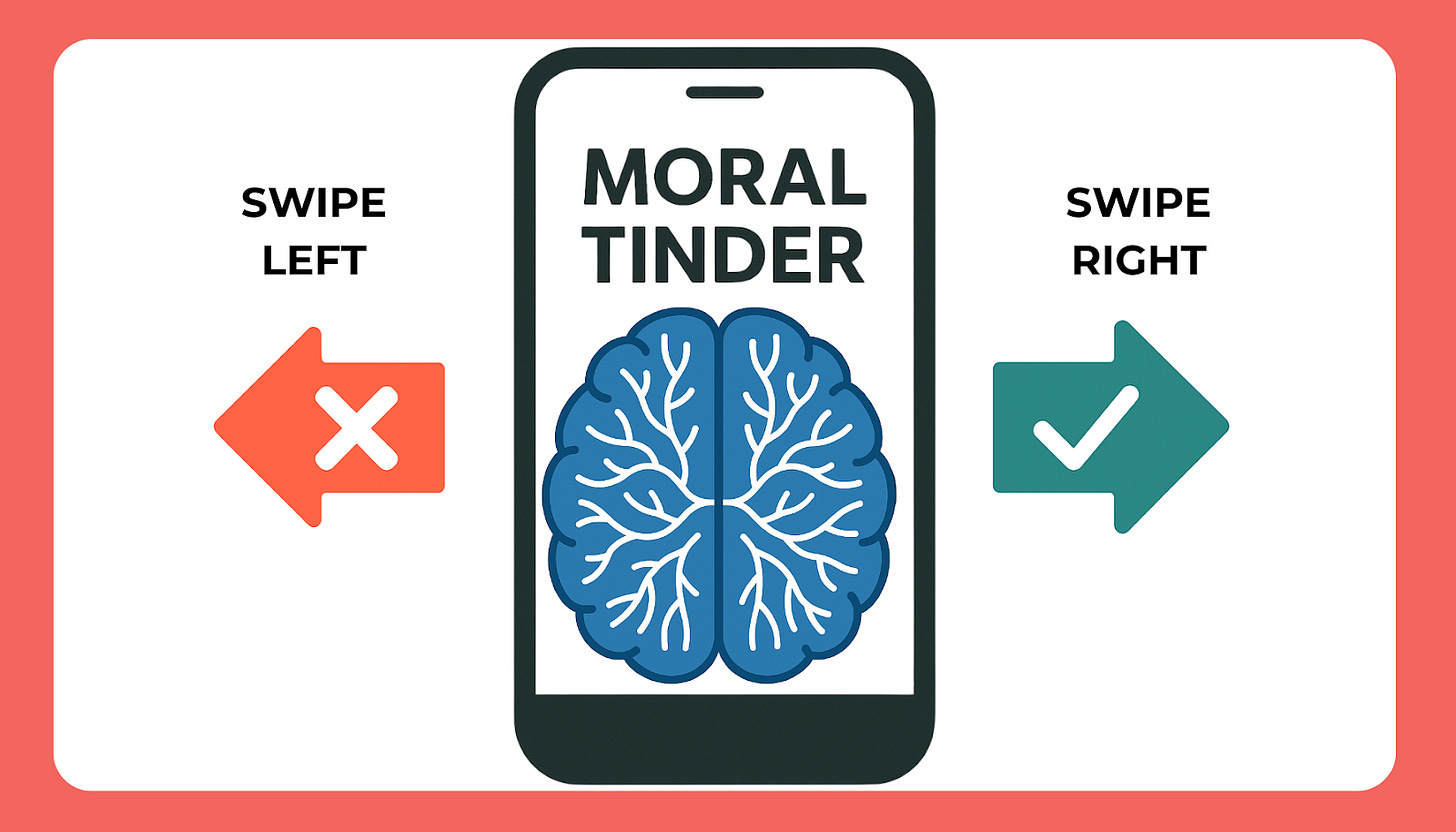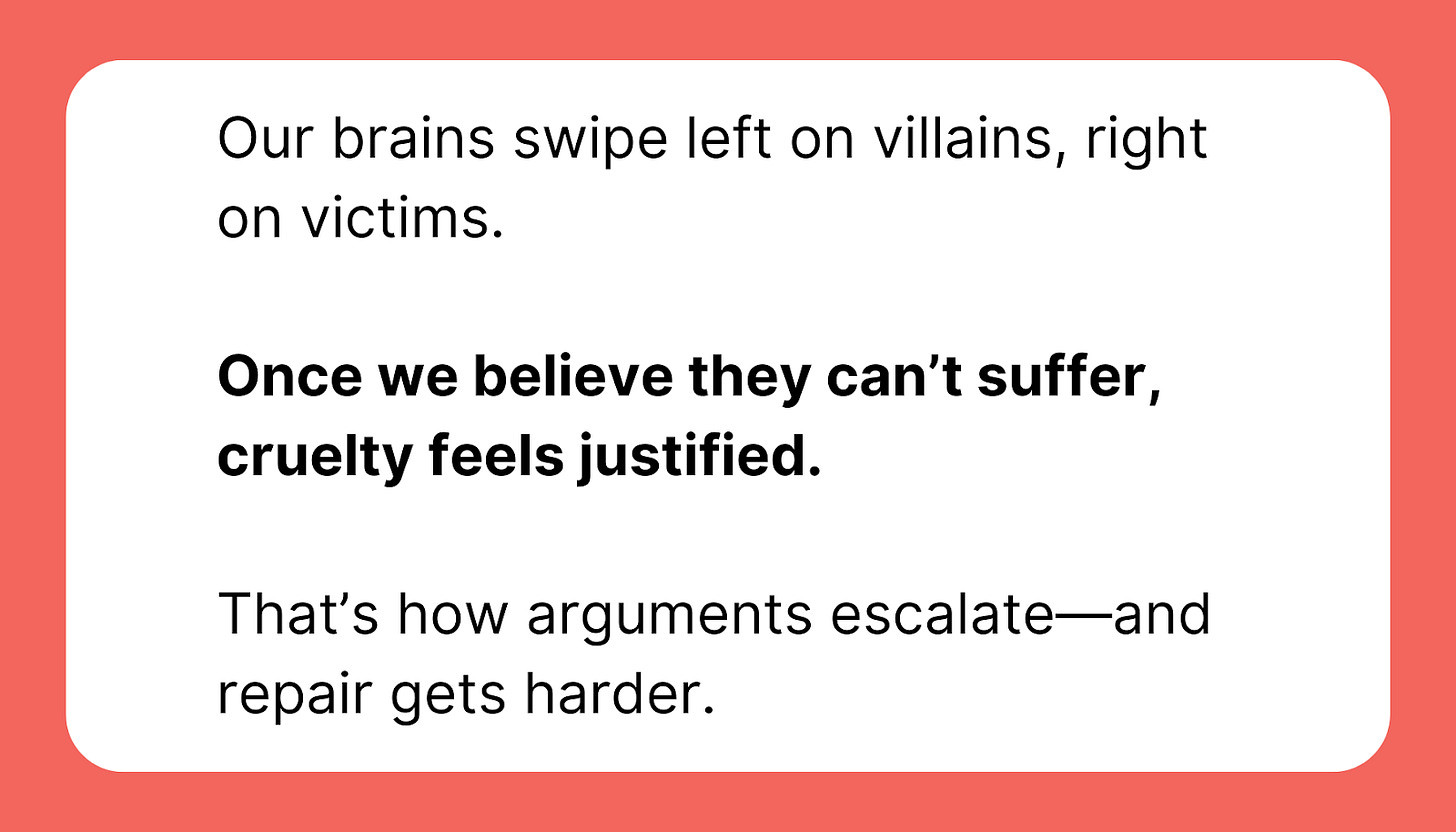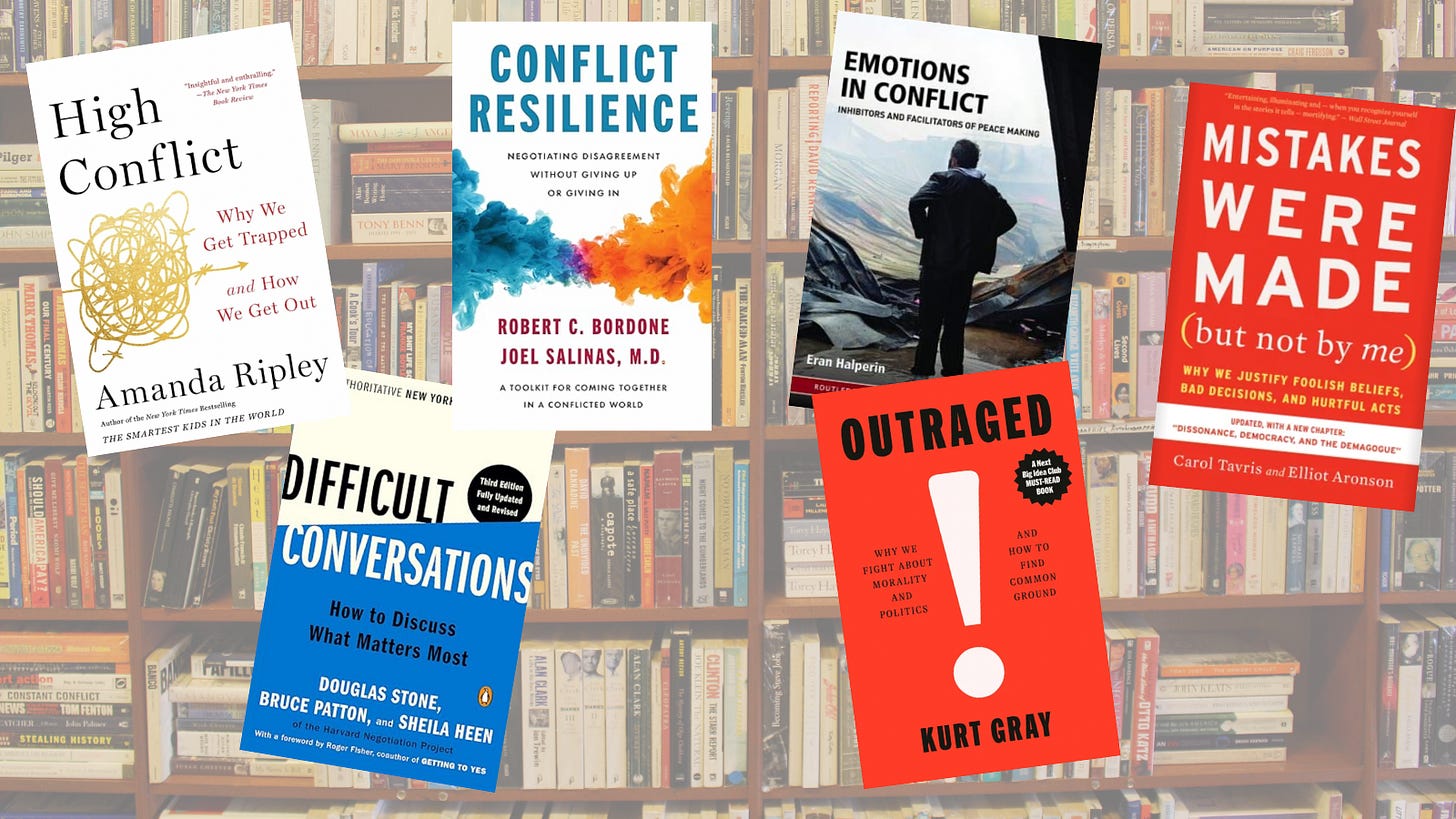Your Brain on Moral Tinder
The science of why we swipe away nuance in every argument
Dear Riffers,
As I write this on the eve of Rosh Hashana—a time for reflection and the hope of becoming better versions of ourselves—it feels fitting to think about how we see each other in this complicated world.
It's been another week of upheaval, and you're in good company if you've been feeling horrified and disheartened about the way we humans can view and treat one another. Increasingly, we see rhetoric in which there is a clear hero, an obvious villain, and absolutely zero moral complexity.
We might wonder how we’ve gotten here, but in truth, this is something our brains naturally do. They operate like the world’s most biased dating app. Everyone’s profile either gets an instant swipe right (hero) or swipe left (villain), with no “it’s complicated” option in sight.
This isn’t just about politics or culture wars. The same mental swiping happens in our closest relationships. Between partners debating who started the fight. Between friends arguing about weekend plans. Between family members about politics.
In moments where a little nuance could help us repair and reconnect, our brains often default instead to oversimplification.
It’s a Binary World… Or Is It?
Social psychologist
studies something he calls "moral typecasting.” It’s basically a description of how our brains automatically sort people in conflicts. Two simple profiles are most easily available to us: innocent victim (swipe right, usually starring us) and merciless villain (swipe left, whoever made us feel bad).To see this in action, just reflect on your last heated discussion. Were your initial thoughts something like, "You know what? This person is making some really valid points here"? Or was it more like, “This person is the worst, and I am obviously the only reasonable one in this relationship”?
When we're hurt or morally outraged, our brains don't do nuance very skillfully or naturally. What they do with stunning efficiency is binary swiping.
It Gets Worse…
Gray's research reveals something even more concerning about what happens during our mental swiping sessions:
Swipe-left profiles (them): We see them as emotionless robots with complete control over their actions but zero capacity for genuine suffering—basically psychological catfish who deliberately chose to be terrible.
Swipe right profiles (us): Vulnerable souls with authentic feelings who hurt deeply but had no real choice in how we got here.
Evolutionarily, this made sense. When making connections meant “Will this person help me survive winter or leave me for the saber-tooth tigers?”, quick moral judgments were life-or-death decisions. Taking the time for nuance was a luxury our premodern ancestors couldn’t afford.
But our brains are still running that same binary dating app for complex modern situations that desperately need more than two categories.
If you do a quick review, you’ll likely see that most people assign themselves the victim profile. We're the ones who are genuinely hurt and were not responsible for creating this mess; “they” are the ones who deliberately chose to cause harm and are somehow immune to real pain.
And here's where it gets truly dangerous: believing the other person can't actually suffer gives us permission to say or do things that would be unthinkably cruel to someone who could feel pain. After all, you can't hurt a sociopath or a robot, right?
This is how perfectly decent people end up writing vicious comments, spreading rumors, or escalating conflicts to devastating ends—all without a shred of guilt. We convince ourselves we’re just defending against someone who chose to be harmful and who literally cannot be wounded by our response.
We view people on our side as misunderstood do-gooders who are unfairly characterized as "bad" when we're obviously "good." But everyone on the other side? Well, they're clearly part of the mob we're worried about.
Why This Matters Right Now
In our current moment, where everyone's accusing everyone else of hypocrisy, we are watching moral swiping play out like the world’s worst reality show. Each side sees its own complex, nuanced profile while reducing opponents to obvious left-swipe rejects.
The pattern shows up everywhere:
"They're hypocrites!" (while our contradictions represent growth and learning)
"They can't hear reality!" (while our defensiveness is justified)
"They started this whole mess!" (while our escalation is a necessary response)
It’s not that we’re wrong about our concerns. It’s more that any conclusion that can be reduced to such a simple binary is probably missing some important information. It’s like trying to understand a novel by only reading the first and last sentences and assuming that the middle is just fluff. Word to the wise: the middle is where the complexity that allows us to make sense of the beginning and end lives.
What this research suggests is that if you're absolutely certain about who deserves to be swiped left in any current controversy, you're probably stuck in binary mode. Not necessarily wrong, but trapped in a psychological process that only offers two options when reality contains profiles with much more complexity than your brain’s warp-speed judgements can reflexively entertain.
A Small Practice to Exit the Binary
Next time you find yourself in the middle of a heated discussion (or doom-scrolling through one), try asking yourself:
What complexity might I be missing here?
What would it look like if the person I've swiped left on actually had understandable reasons for their position?
How might I change my actions or words if I knew the other side felt vulnerable and scared?
What if my own "side" had some blind spots or unintended consequences you hadn't considered? How would I want to act in that situation?
These are questions I have partners ask one another in the couples therapy room. Keep in mind, the goal isn't to suddenly agree with everyone or become a doormat; it's to see if you can hold more than two categories in your mind at once. Can you find the human complexity that your brain's dating app is trying to swipe away?
If you find yourself immediately resistant to this idea ("But Yael, you don't understand—these people really ARE terrible!"), that resistance is actually valuable data. It's like your phone buzzing with a notification that you're deep in the app.
In our closest relationships (and our looser, societal ones, too), we can help to interrupt those exhausting cycles of blame and actually open the door to repair, connection, and better understanding of one another.
Further Reading
This stuff is tricky to navigate in practice. Here are some of my favorite books that dig deeper into the psychology behind these patterns and offer practical approaches. Plus, books are good for our hearts and souls—they give us information, empathy, and connection all at once. So check these out! And please also share your favorites in the comments!
Outraged by
(the researcher mentioned above—his book is a terrific field guide to your brain's moral dating app)Mistakes Were Made (But Not By Me) by Carol Tavris and Elliott Aronson
Conflict Resilience by Robert Bordone and Joel Salinas
Emotions in Conflict by Eran Halperin
Difficult Conversations by Douglas Stone, Bruce Patton, and Sheila Heen
Hit like if this resonated, and please forward to someone who might benefit from reading this. (But maybe don't send it as a passive-aggressive hint to your argumentative relatives. That would be... well, you know. 😉)
P.S. If you're thinking "This is all well and good, but what about when people really ARE acting terribly?"—congratulations, you're asking exactly the right question. That's what the advanced tools are for.
Book Club Alert! 📚
Speaking of complexity and moral nuance, our book club is diving into Demon Copperhead by Barbara Kingsolver on October 8th, 12-1pm EST. This Pulitzer Prize winner is basically a masterclass in seeing past binary judgments—it follows a character who could easily be dismissed as "just another statistic" but reveals layers of humanity that will completely rewire how you think about people society tends to write off.
Plus, I'll be sharing some behind-the-scenes details about my upcoming book on interpersonal misunderstandings (spoiler: it will involve more moral typecasting research but significantly fewer dating app references).
If you're interested but finances are tight, just message me. (Good conversations about books shouldn't be financially prohibitive!)
Here are the Zoom details, which will be sent again before the meeting:
Keep reading with a 7-day free trial
Subscribe to Relational Riffs to keep reading this post and get 7 days of free access to the full post archives.




